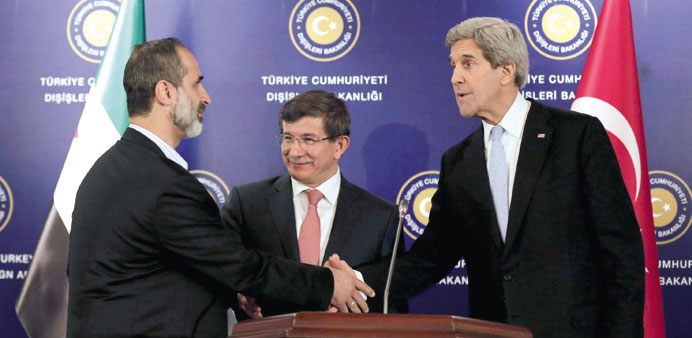Khatib, Davutoglu and Kerry shake hands during a press conference in Istanbul on Saturday.
AFP/Damascus
Syrian opposition chief Moaz al-Khatib is determined to step down in the face of what he sees as world “inaction” as government forces recapture territory from the rebels, colleagues said yesterday.
Troops loyal to President Bashar al-Assad made advances outside the capital and near the Lebanese border, and a watchdog said that scores of bodies, some disfigured, had been recovered after days of ferocious fighting.
Khatib’s renewed threat to quit, almost a month after he first tendered his resignation amid recriminations over the choice of a perceived Muslim Brotherhood nominee as rebel prime minister, threw the opposition into fresh disarray as debate about the wisdom of arming it intensifies.
“I can confirm Khatib’s resignation is final,” National Coalition member Marwan Hajjo told AFP, following a meeting in Istanbul of the “Friends of Syria” group of Arab and Western governments that support the opposition.
A source close to the Coalition said that its members have already launched consultations in the search for a successor.
Khatib himself posted a short statement on his Facebook page saying: “When a bird is in his cage, he remains imprisoned and paralysed. Yesterday I came out of the cage of deception that I was in.”
Hajjo, who heads the Coalition’s membership committee, said Khatib was stepping down because of a “lack of real action on behalf of the Syrian people”.
“The international community, the Friends of Syria group, should be providing heavy weapons to enable the Syrians to defend themselves,” he said.
Assad loyalists made advances yesterday around the rebel-held town of Qusayr near the Lebanese border.
Opposition activists said the army was backed by militiamen and fighters of the Lebanese Shia movement Hezbollah.
“Loyalist troops backed by Hezbollah have taken control of important villages near Qusayr,” said Rami Abdel Rahman of the Syrian Observatory for Human Rights.
Four shells fired from the Qusayr area struck the Hermel region of eastern Lebanon, in what rebels described as retaliation for Hezbollah’s intervention on the side of the Assad government.
Lebanon’s National News Agency reported that three shells hit early yesterday, while a security official and a resident of the town of Hermel said a fourth struck later in the day.
Qusayr has been under rebel control for more than a year.
“The only reason why the regime is advancing in the Qusayr area is because of Hezbollah’s troops. Hezbollah fighters advance on the ground, while the (Syrian) air force gives them cover,” Qusayr-based activist Hadi al-Abdallah said via the Internet.
In a meeting with a visiting Lebanese delegation yesterday, Assad paid tribute to the “Syrian people’s resistance and support for the courageous army”, the official Sana news agency reported.
Outside Damascus, the army stormed the town of Jdaidet al-Fadl, after five days of fighting in which at least 80 people have been killed, the Observatory said.
Abdel Rahman said he feared the death toll could be higher but that it was difficult to document after the entry of regime forces into the town.
“We call on the International Committee of the Red Cross to send a delegation to Jdaidet al-Fadl in order to investigate,” he said.
The Observatory distributed amateur video footage that it said was filmed in the town and that showed the bodies of men laid out on the ground, some with mutilated faces and covered in blood.
US announces doubling of non-lethal aid to opposition
US Secretary of State John Kerry said yesterday that the US would double its non-lethal aid to opposition forces in Syria to $250mn.
Kerry stopped short of a US pledge to supply weapons to insurgents fighting to overthrow Syrian President Bashar al-Assad. But he said that the rebels’ foreign backers were committed to continuing support and had decided to channel all future aid through the insurgents’ Supreme Military Council.
He added that “there would have to be further announcements about the kind of support that might be in the days ahead” if Syrian government forces failed to pursue a peaceful solution.
Speaking after a meeting of the Syrian opposition and its 11 main foreign supporters in Istanbul, Kerry said the US would provide an additional $123mn in non-lethal assistance to the rebels, bringing the total of this kind of US help to $250mn.
Kerry urged other foreign backers to make similar pledges of assistance with the goal of reaching $1bn in total international support.
At a later news conference yesterday afternoon, Kerry said he would push to ensure that new non-lethal military aid would be delivered as soon as possible.
Kerry said the equipment could include communications equipment, body armour, night vision goggles and medical supplies to assist the insurgents.
Other military supplies pledged by Kerry in late February, including ready-made meals and medical supplies, are only expected to be delivered by the end of this month.
Asked when the opposition could expect to receive the new supplies, Kerry told reporters:
“I can promise you that as soon as I return to Washington which is early this next week, I am going to press as hard I can to make sure that this is a matter of weeks that we are talking about...this has to happen as quickly as possible.”
Kerry said he had discussed ways to break the logjams during meetings with Turkish Foreign Minister Ahmet Davutoglu, who hosted the meetings on Saturday between the Syrian opposition and their foreign backers.

